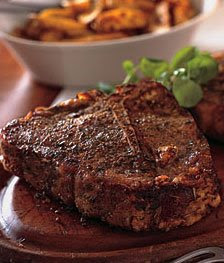“Tenderness” Gene Sequenced in Beef Cattle
 Tenderness is regarded as being the most important trait that consumers consider
Tenderness is regarded as being the most important trait that consumers consider
when purchasing steak. It has long been known that a number of different factors can influence tenderness during the processing phase, for example how long the meat is aged before being sold. However, until recently, little was know about the chemical or genetic mechanisms that affected how tender a steak was.
Researchers at the Agricultural Research Institute (ARI) discovered that tenderisation was to some extent caused by a protein called µ-calpain which degraded muscle proteins. They also discovered that µ-calpain required calcium for this activity, and found that by injecting it directly into meat they could increase the meat’s overall tenderness. Food technologists then found that the activity another protein called calpastatin determined how much µ-calpain was active. This discovery has been confirmed in other laboratories and it seems that µ-calpain and calpastatin can affect up to a 45% variation in a meat’s tenderness.
After testing a number of crossbred cattle exhibiting varying degrees of tenderness the ARI researchers were successful at sequencing the gene which produced the µ-calpain protein. A DNA test has since been released which can single out particularly tender or tough animals from a large herd of cattle. There are however many other factors, both environmental and genetic which affect a meat’s tenderness, but with continuing research we may one day reach the goal of the “perfect steak”.
Added by Hugo Murrell
s41389191
Primary Source:
http://www.agclassroom.org/teen/ars_pdf/family/2005/02steak.pdf
Secondary Sources:
http://www.ari.gov.cy/index.htm
http://jas.fass.org/cgi/content/abstract/84/3/520?etoc
http://www.ncbi.nlm.nih.gov/entrez/query.fcgi?cmd=Retrieve&db=pubmed&dopt=Abstract&list_uids=15537766